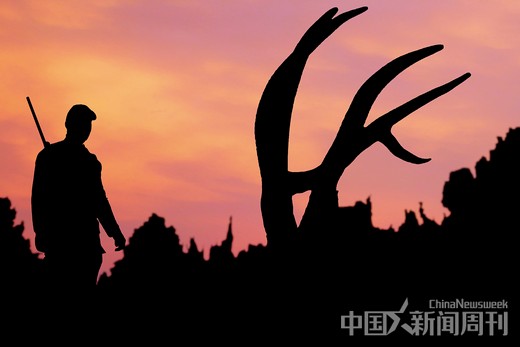
For decades, Chinese billionaires have become known for making safe investments in vintage alcohol and artworks, but in recent years their attention has gradually shifted from traditional fields to other businesses.
(Ecns.cn) – At least 100 super-rich Chinese people in recent years have taken safaris in foreign countries, not to sightsee or snap photos of wildlife, but to hunt wild game with rifles and bows and arrows, reports China Newsweek.
Their hunting trips have been widely condemned by the public, many of whom say the practice is "medieval," cruel and wasteful.
Recent reports of Chinese hunters paying 500,000 yuan (US$79,150) for an opportunity to kill endangered polar bears during a two-week expedition in Canada (the service includes a taxidermist who prepares a rug made of the animal's fur) have fueled even greater resentment toward the rich's new hobby.
To hunt overseas
Trophy hunting, a kind of wild game hunting in which parts of the slain animal are kept as mementos or "trophies," originated among white colonists in Africa centuries ago. The purpose is not necessarily for food or commercial purposes, but simply for the joy of the chase.
In foreign countries, licenses that permit such types of hunting usually cost thousands of dollars; and after taking other service charges into consideration, the cost of hunting a wild animal may be far higher than its actual value, making it a "rich man's game."
The first person to bring trophy hunting to China was Liu Guolie, a wealthy Chinese-American who discovered abundant wildlife in China during his world tour in the 1980s, according to China Newsweek.
Liu arrived in China in 1984 and found that Dulan County of Qinghai Province was perfect for hunting blue sheep, so he proposed the establishment of a hunting ground in the vicinity.
The Dulan International Hunting Ground was soon opened. Covering 13,000 hectares, it was home to about 160,000 wild animals, including snow leopards, white-lipped deer, blue sheep and argali (mountain sheep), which though highly-protected could still be hunted. In 1987, the Dulan Hunting Ground received over 700 foreign hunters, according to Xinhua.
That same year, a hunting ground for argali was opened in Gansu Province; three years later, the Xinjiang Uyghur Autonomous Region also opened a hunting ground for argali; and in 1992, Sichuan Province opened a hunting ground for Sambar deer.
However, in 2006, the Law on the Protection of Wildlife led to the enforcement of a ban on hunting animals in China, pushing wealthy people overseas in search of hunting grounds despite much higher costs.
Now in Africa, Chinese tycoons pay license fees to kill exotic animals. A giraffe normally costs $3,000, to shoot a lioness costs $15,000 and to bag a male lion runs as high $50,000. The cost of taking down a rhinoceros, a leopard or an elephant is even higher.
The business behind the butchery
When rich businessmen found themselves without legal domestic hunting grounds in 2006, keen observers immediately smelled a business opportunity.
By setting up safari clubs and helping members travel abroad for trophy hunting, these entrepreneurs have made substantial profits by providing package services to satisfy the needs of Chinese hunters.
Wang Wei, General Manager of China Adventure Travel, is one such entrepreneur. His company now helps rich people apply for licenses to hunt big game abroad in accordance with international practices.
W. Scott Lupien, an expert in the international hunting trade, is also a key figure in the local business and facilitates trips for many tycoons. He set up his own safari club in Beijing in 2007.
By taking Chinese hunters to Africa, Lupien has simplified the process and prevented many hunters from using illegal means, and has developed a good reputation since his first group of four went to South Africa in 2009.
Fury and suspicion
For decades, Chinese billionaires have become known for making safe investments in vintage alcohol and artworks, but in recent years their attention has gradually shifted from traditional fields to other businesses.
Huang Yimin, who made his fortune in the petrochemicals industry, became the first person in China to own his own island in late 2011 when he won a 50-year lease from the government for 3.4 million yuan (US$538,900).
Huang then invested a great deal of money to turn the island into a private game reserve stocked with wild boar, pheasants and barking deer.
Huang's investment is a reflection of the increasing zeal of wealthy Chinese for trophy hunting: in the past few years more than 200 such hunting clubs have sprung up across the country.
Some hunting grounds have conducted research into the Chinese mentality, and make special preparations whenever they know Chinese hunters are coming, notes China Newsweek.
In some Canadian hunting grounds, for example, operators feed black bears on a tight schedule. When Chinese hunters arrive, it never takes long for the bears to show up in search of food, making hunting them down relatively easy, a big draw for hunters who want quick results.
Moreover, Chinese hunters like to chop off all four paws of a bear and use their own seasonings to cook them. Similar stories also include extracting bear bile, which has high medicinal value in China, all of which usually horrifies Western hunters.
Even in China, an overwhelming majority of people now condemn these practices as nothing more than rich people showing off their guns and wasting money that could be used in much more meaningful ways.
Many also worry that wealthy Chinese hunters may have already created a negative image of China in the countries where they hunt or engage in animal cruelty.

Copyright ©1999-2011 Chinanews.com. All rights reserved.
Reproduction in whole or in part without permission is prohibited.